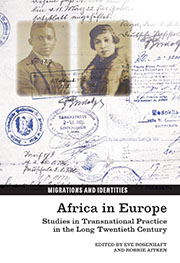Book contents
- Frontmatter
- Contents
- Acknowledgements
- List of Illustrations
- List of Abbreviations
- List of Contributors
- 1 Introduction
- I Enacting Identity: Individuals, Families and Communities
- 2 Prince Dido of Didotown and ‘Human Zoos’ in Wilhelmine Germany: Strategies for Self-Representation under the Othering Gaze
- 3 Schwarze Schmach and métissages contemporains: The Politics and Poetics of Mixed Marriage in a Refugee Family
- 4 ‘Among them Complicit’? Life and Politics in France's Black Communities, 1919–1939
- 5 ‘In this Metropolis of the World We Must Have a Building Worthy of Our Great People’: Race, Empire and Hospitality in Imperial London, 1931–1948
- II Authenticity and Influence: Contexts for Black Cultural Production
- III Post-colonial Belonging
- IV Narratives/Histories
- Bibliography
- Index
3 - Schwarze Schmach and métissages contemporains: The Politics and Poetics of Mixed Marriage in a Refugee Family
from I - Enacting Identity: Individuals, Families and Communities
- Frontmatter
- Contents
- Acknowledgements
- List of Illustrations
- List of Abbreviations
- List of Contributors
- 1 Introduction
- I Enacting Identity: Individuals, Families and Communities
- 2 Prince Dido of Didotown and ‘Human Zoos’ in Wilhelmine Germany: Strategies for Self-Representation under the Othering Gaze
- 3 Schwarze Schmach and métissages contemporains: The Politics and Poetics of Mixed Marriage in a Refugee Family
- 4 ‘Among them Complicit’? Life and Politics in France's Black Communities, 1919–1939
- 5 ‘In this Metropolis of the World We Must Have a Building Worthy of Our Great People’: Race, Empire and Hospitality in Imperial London, 1931–1948
- II Authenticity and Influence: Contexts for Black Cultural Production
- III Post-colonial Belonging
- IV Narratives/Histories
- Bibliography
- Index
Summary
This chapter examines aspects of the transnational experience of a family founded by a German-educated Cameroonian, Dualla Misipo, and more particularly the ways in which that experience was processed in narrative texts authored by Misipo and his son Ekwé, in German and French respectively, between the 1920s and the end of the twentieth century. The Misipos experienced a double displacement over geographical and linguistic boundaries; Dualla Misipo travelled from Africa to Germany before the First World War and then took his family from Germany to France in 1937. The latter move coincided with and indeed was occasioned by a political watershed, the rise of Nazism and a new world war; it was facilitated by the fact that the Misipos, while still resident in Germany, had become subjects of the French state when control of Cameroon was transferred from Germany to France under the Versailles Treaty. Taken together, the texts document ‘transnational lives’ in terms of biological and cultural genealogies and journeys in time and space; more particularly, they offer an unusual insight into lives shaped by the overlapping of colonial and post-colonial circumstances and of nation state jurisdictions, whose tensions offer an extreme type of the twentieth-century condition.
By the same token, the texts challenge interpretation. Those multiple displacements generate uncertainties about how and where the texts and their authors ‘fit’ in our critical canons and historical narratives, which continue to be structured around distinct nation state cultures with their respective colonial entanglements and racial histories.
- Type
- Chapter
- Information
- Africa in EuropeStudies in Transnational Practice in the Long Twentieth Century, pp. 34 - 54Publisher: Liverpool University PressPrint publication year: 2013

